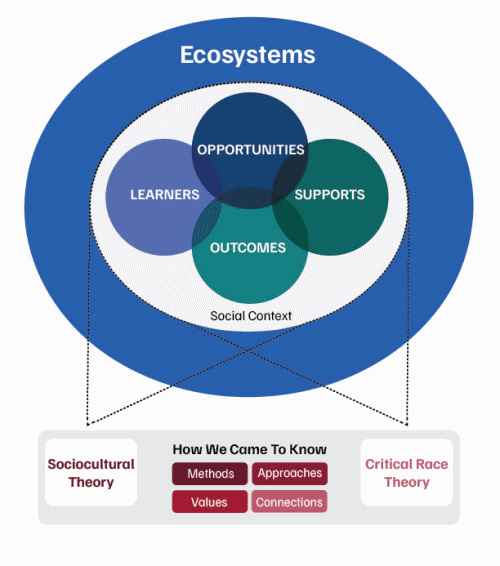The 21st Century Learning Ecosystem Opportunities (21 CLEO) research was launched to increase understanding of the complexities of learning ecosystems in employer-supported education and training initiatives. This work envisions workplace learning as ecosystems shaped by a constellation of factors that operate in dependent and independent ways. This website contains an interactive summary of insights about working learners, the types of education and training initiatives offered to working learners, and the outcomes from participating in employer-supported education and training initiatives.
Model for Understanding Ecosystems of Employer
Supported Education and Training Initiatives

Learners, learning opportunities, supports, and outcomes are overlapping components within ecosystems, which themselves are situated within social contexts. Within the social context, issues such as race, language, and socioeconomics play an important role in the health of learning ecosystems. Using the lenses of sociocultural theory and Critical Race Theory, we outline our methods, approaches, values, and connections along with a summary of key findings.
In this interactive report, we share observations about what we learned during the four years of the 21 CLEO research initiative. The findings are drawn from the collection of presentations, blog posts, and other publications through which we have shared our insights along the way, as well as new material developed as part of our final write-up.
Throughout this research, we have sought to elevate the perspectives, needs, and goals of the working learner, and make them visible to workforce development practitioners and policy makers, adult educators, researchers, employers, and to the adult learners themselves. In this interactive report, we share observations about what we learned during the four years of research. This report offers a synthesis of the findings and links that allow readers to go deeper into the work. In the sections that follow, the purpose, significance, and evolution of the research will be addressed to illustrate why and how we conducted this research.
The purpose of the 21 CLEO research was to respond to the need for employers, educators, and policy makers to better understand (1) the characteristics of employer-supported education and training initiatives currently available to frontline service workers and (2) how to best engage these workers in the development of digital problem solving necessary to succeed in the 21st Century workplace.
The four-year research effort was designed to be iterative in nature, meaning we expected to further develop our approach, the research questions, and research instruments such as interviews and surveys in response to what we learned along the way.
This research examined the constellation of factors that influence the 21st century learning ecosystems in order to open up opportunities for working learners’ skills and knowledge development.
The research examines three areas: opportunities, learning, and support. We hope that working learners’ opportunities to learn can be expanded and become more flexible in response to rapid changes in the workforce and technological landscape. We draw attention to ways working learners could be better supported on the job to learn. This work was designed to strengthen working learners’ capacity to engage with others and develop a self-efficacy and to continually learn.
The study adopted an iterative approach that continued throughout the entire research process. Research moved through four phases.
Phase 1 included a review of the field literature conducted at the same time as the initial round of semi- structured interviews and analysis.
Phase 2 involved additional interviews in additional geographic areas with a refined digital questionnaire and set of interview questions.
Phase 3 was focused on analysis using Critical Race Theory (CRT) as a lens for data analysis. Based on what emerged from the CRT analysis, we conducted follow-up interviews with selected participants to clarify perceptions and experiences of working learners and gain an understanding of their long-term experiences. ‘
Phase 4 included a follow-up questionnaire we sent to all working learner participants in order to better understand the changes they experienced over three years. We also held a three-part virtual convening with working learners and research partners.
The 21 CLEO research team consists of four individuals from different but related backgrounds. Each individual brought unique insights to the research process and data analysis.
Jill Castek is a university professor and researcher who collaborates with librarians, community college educators, and other researchers to examine digital literacies acquisition and digital problem solving. Kathy Harris is an applied linguist, adult ESOL learning specialist, and adult educator. She researches digital learning innovations and directed the Learner Web initiative, an online portal for collaboration and learning materials shared among many adult education providers. Gloria Jacobs is an educational researcher who explores digital literacies, digital problem solving, and learning across the lifespan from adolescents to adults within informal and formal settings. Jen Vanek is an ESOL scholar, teacher educator, instructional designer, and researcher whose research focuses on digital literacies, technology in instruction, language learning, and workforce development.
Key to our work is understanding our positionality. As white women we are limited in our understanding of the lived experience of working learners who are Black, Indigenous, or People of Color. We recognize that we cannot and should not speak for Black, Indigenous, or People of Color. Rather, we hope that our drawing on CRT helps to illuminate structural aspects of racism that white people have been apt to miss.
The research team was assisted by graduate assistants and interns who helped with the initial field review of the literature, writing blog posts, creating graphics, keeping the data organized, and conducting analysis. The team was also assisted by a communications team who helped maintain the blog and share our work.
The 21st Century Learning Ecosystem Opportunities (21 CLEO) research was supported by a grant from Walmart. The opinions and ideas expressed do not necessarily reflect the opinions of Walmart.

